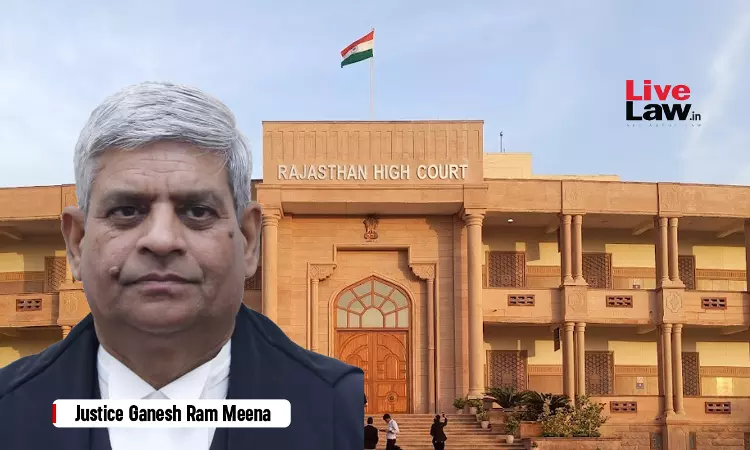- Home
- /
- High Courts
- /
- Rajasthan High Court
- /
- Rajasthan High Court Enhances...
Rajasthan High Court Enhances Compensation Of Paralysed Road-Accident Victim To ₹1.9 Cr, Says It's Not Charity But Moral Necessity
Nupur Agrawal
4 July 2025 11:30 AM IST
While hearing a challenge to the compensation of Rs. 1.49 crores awarded by the motor accident tribunal to a 21-year-old woman, Rajasthan High Court observed that the 100% lower body paralysis of the road-accident victim was not just an injury, but a “deep enduring rupture in the fabric of her life” that affected her sense of identity, independence and confidence.The high court thus...
While hearing a challenge to the compensation of Rs. 1.49 crores awarded by the motor accident tribunal to a 21-year-old woman, Rajasthan High Court observed that the 100% lower body paralysis of the road-accident victim was not just an injury, but a “deep enduring rupture in the fabric of her life” that affected her sense of identity, independence and confidence.
The high court thus enhanced the compensation from Rs. 1,49,88,153 Crores awarded by the tribunal to Rs. 1,90,68,153 Crores.
The bench of Justice Ganesh Ram Meena further opined that any support or compensation received by her whether from the legal system or the society at large was not a favour but a necessary step towards justice, inclusion and human dignity, and the same must acknowledge not just the cost of medical case but the loss of opportunities, dignity and dreams. The court said that it had placed barriers to her path to family life and created heavy burden for those who loved and supported her.
“In cases of grievous and permanent disability, such as 100% paralysis of the lower body, the courts must adopt a comprehensive approach to determine just compensation. This approach must include not only medical and financial implications but also the irreversible disruption of personal autonomy, educational potential, professional aspirations, and social well-being.”
“Enhanced compensation is not a windfall; it is a moral and legal necessity. It is an attempt by the justice system to at least partially restore what was taken from her - future, a body, a chance to live on her own terms. Anything less would be an injustice too great to ignore.”
The claimant was a 21 year old women studying at National Institute of Technology, Uttarakhand, who was hit by a vehicle owing to rash and negligent driving by the driver resulting in 100% paralysis of her body below the waist. She was awarded around Rs. 1.5 Crores as compensation by the tribunal. This compensation was challenged by the respondents for being excessively disproportionate, and also by the claimant for being inadequate.
After hearing the contentions, the Court observed that the 100% disability of the lower body was not merely a medical condition but a life altering event affecting the individual physically, emotionally, socially and economically. The Court highlighted various ways in which the disability impacted the individual's life.
It was stated that the incident not only brutally interrupted the professional journey of the claimant who was at the brink of it, but also gave her emotional trauma owing to the loss of autonomy over her body for even daily routine activities.
The Court further highlighted that public infrastructure in many regions remained inaccessible for disabled persons, making even simple outings or travel difficult and often humiliating.
Furthermore, the Court explained how the injury might also drastically diminish the prospects of any romantic relationships or marriage for victim. It was held that,
“There is often a social stigma attached to disability. People may assume that a paralyzed individual is incapable of being a romantic partner, of managing a household, or of bearing and raising children—even though these assumptions are frequently incorrect…Even if she does find someone who loves and accepts her, she may hesitate to enter into a relationship due to internal fears—fear of rejection, fear of being seen as a burden, or fear of not being able to meet traditional expectations of a partner or spouse…Consequently, the emotional toll of possibly being deprived of romantic companionship or family life can be devastating”
The Court also highlighted the impact on the girl's family opining that parents often carry the emotional burden of believing that it was their duty to protect their child, and watching her struggle with depression, frustration, and isolation took a deep toll on their mental health.
In this light, reference was made to the Supreme Court case of Raj Kumar v Ajay Kumar in which Section 168 of the Motor Vehicles Act delineating “just compensation” was interpreted in a broad and liberal manner in the favour of the victims beyond a mere mathematical calculation. It included holistic evaluation of pain, suffering, loss of amenities, future medical needs and the impact on the life's trajectory.
Further reference was made to the Apex Court's case of Erudhaya Priya v State Express Transport Corporation Ltd. in which it was emphasized that when a young girl suffered from 100% permanent disability, compensation must reflect her loss of future prospects, marriageability and independent life.
In this background, the Court ruled that, “any compensation must reflect constitutional values—especially Article 21 (right to life with dignity), Article 14 (equality before law), and Article 15 (protection Against discrimination, including on disability grounds). Denial of adequate compensation amounts to a second injustice—compounding the original wrong with institutional apathy…This compensation is not charity—it is a rightful acknowledgment of the permanent damages inflicted on her ability to live a full, independent, and dignified life.”
“Her accident was not her fault. It was a consequence of someone else's negligence. That negligence has now sentenced her to a life of limitation and hardship. If the justice system fails to acknowledge this suffering with adequate compensation, it adds insult to injury. The law must not merely count the rupees lost, but the dreams denied.”
Title: Kumari Neelam v Jai Prakash Natani & Ors.
Citation: 2025 LiveLaw (Raj) 224



